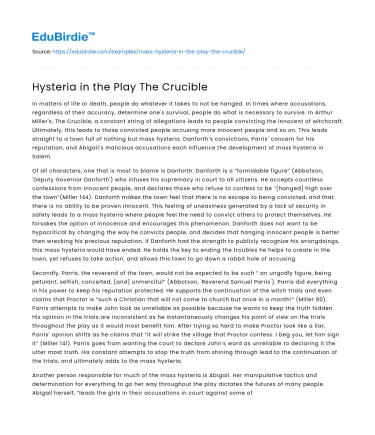In matters of life or death, people do whatever it takes to not be hanged. In times where accusations, regardless of their accuracy, determine one's survival, people do what is necessary to survive. In Arthur Miller's, The Crucible, a constant string of allegations leads to people convicting the innocent of witchcraft. Ultimately, this leads to those convicted people accusing more innocent people and so on. This leads straight to a town full of nothing but mass hysteria. Danforth’s convictions, Parris’ concern for his reputation, and Abigail’s malicious accusations each influence the development of mass hysteria in Salem.
Of all characters, one that is most to blame is Danforth. Danforth is a “formidable figure” (Abbotson, 'Deputy Governor Danforth') who infuses his supremacy in court to all citizens. He accepts countless confessions from innocent people, and declares those who refuse to confess to be “[hanged] high over the town”(Miller 144). Danforth makes the town feel that there is no escape to being convicted, and that there is no ability to be proven innocent. This feeling of uneasiness generated by a lack of security in safety leads to a mass hysteria where people feel the need to convict others to protect themselves. He forsakes the option of innocence and encourages this phenomenon. Danforth does not want to be hypocritical by changing the way he convicts people, and decides that hanging innocent people is better then wrecking his precious reputation. If Danforth had the strength to publicly recognize his wrongdoings, this mass hysteria would have ended. He holds the key to ending the troubles he helps to create in the town, yet refuses to take action, and allows this town to go down a rabbit hole of accusing.
Save your time!
We can take care of your essay
- Proper editing and formatting
- Free revision, title page, and bibliography
- Flexible prices and money-back guarantee
Secondly, Parris, the reverend of the town, would not be expected to be such “ an ungodly figure, being petulant, selfish, conceited, [and] unmerciful” (Abbotson, 'Reverend Samuel Parris'). Parris did everything in his power to keep his reputation protected. He supports the continuation of the witch trials and even claims that Proctor is “such a Christian that will not come to church but once in a month!” (Miller 90). Parris attempts to make John look as unreliable as possible because he wants to keep the truth hidden. His opinion in the trials are inconsistent as he instantaneously changes his point of view on the trials throughout the play as it would most benefit him. After trying so hard to make Proctor look like a liar, Parris’ opinion shifts as he claims that “it will strike the village that Proctor confess. I beg you, let him sign it” (Miller 141). Parris goes from wanting the court to declare John’s word as unreliable to declaring it the utter most truth. His constant attempts to stop the truth from shining through lead to the continuation of the trials, and ultimately adds to the mass hysteria.
Another person responsible for much of the mass hysteria is Abigail. Her manipulative tactics and determination for everything to go her way throughout the play dictates the futures of many people. Abigail herself, “leads the girls in their accusations in court against some of the most well-respected and good townspeople” (Blooms 16). She continuously accuses people that get in the way of what she wants. This vindictive behavior increases the mass hysteria throughout Salem. With anything they did, the townspeople dared cross Abigail. They are petrified that with one word Abigail could get the rope imposed on them too. People feared Abby, yet she has absolutely no authority except the courts being on her side. Abigail intelligently and spitefully, “uses the town's superstitious leanings to her own advantage” (Abbotson, “Abigail Williams”) regardless of the effects it has on the townspeople. Abigail’s word creates and justifies the hanging of about twenty people. If Abigail was less captivated by the idea of John loving her, this mass hysteria would not have been all that it is now. She validates the deaths of numerous innocent people and acts as if they are at her dismay. Those who are hanged are real people with families and priorities of their own. They are not pawns on the chess board, yet that is all they are to Abigail. Her selfish and unempathetic mindset leads to the mass hysteria spreading throughout all of Salem.
In conclusion, the behaviors in which Danforth, Parris, and Abigail exert all inhibit the ending of the witch trials and cause the widespread mass hysteria. The large amount of immortality and corruption bestowed in people throughout the trials lead to boundless allegations against innocent people. It is a mass hysteria that could easily end with one person stepping up and acting morally, yet numerous people, including those mentioned above, stood by and bought into it. Everyone plays their part in the creation of the mass hysteria, but Danforth, Parris, and Abigail have the most impact.






 Stuck on your essay?
Stuck on your essay?

